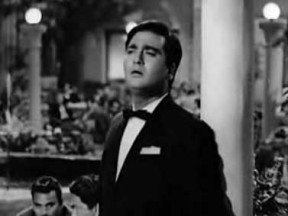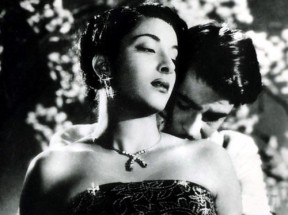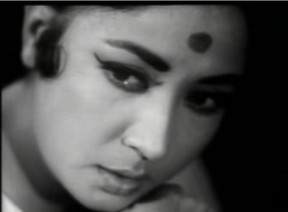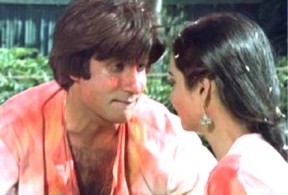It has been a matter of enduring mystery to all those who need the melody of Hindi film songs to relax and be less uptight as to why the lyricists short change the ballads of love and reserve their best for the pining that follows betrayal and infidelity. Think of most songs used for serenading in Hindi films and barring a few exceptions, you will run into cliché soaked declarations of Prem, Pyaar and Mohabbat. On the other hand the songs that testify to the heartache following betrayal are rich in imagery and metaphors.
The earliest one that haunts the collective consciousness of the aficionados is the immortal ‘Ek bewafa se pyaar kiya,’ from the classic Awara that forever immortalised his betrayal with the teasing lines, “bholi soorat wala nikhla lutera, raat chupaaye dil mein, moonh pe saavera” (Look at that innocent faced rogue, his heart is clouded with the darkness of night but his face glows with the promise of the morning). No doubt all the leading ladies Kapoor courted zealously off screen from Nargis to Vyjayanthimala and from Padmini to Simi, only to go back home to his wife and children, agreed whole heartedly with the recrimination.
After that quick condemnation of the unfaithful in the 50s, it was left to two luminous songs from two different films more than a decade later based on the theme of infidelity, with that underrated actor Sunil Dutt, to make their way into the listeners’ hearts.
 Gumrah had Dutt as the lover from the past coming back into the married Mala Sinha’s life only to sing ‘Chalo ek baar phir se ajnabi ban jaye hum dono’ while the indulgent husband Ashok Kumar looked on. The song hid more than it told. When Dutt added “woh afsana jise anjam tak lana na ho mumkin, use ek khubsoorat mod dekar chodna achha (the story that can’t reach its consummation, it’s best to leave it alone after a beautiful twist in the tale), the listener immediately caught on to what was being implied.
Gumrah had Dutt as the lover from the past coming back into the married Mala Sinha’s life only to sing ‘Chalo ek baar phir se ajnabi ban jaye hum dono’ while the indulgent husband Ashok Kumar looked on. The song hid more than it told. When Dutt added “woh afsana jise anjam tak lana na ho mumkin, use ek khubsoorat mod dekar chodna achha (the story that can’t reach its consummation, it’s best to leave it alone after a beautiful twist in the tale), the listener immediately caught on to what was being implied.
Dutt also starred in Yeh Raaste Hain Pyaar Ke based on the Nanavati case that forced the Indian judiciary to discard the jury system. When Dutt is away on duty, playboy Rehman manages to seduce his wife, the ephemerally beautiful Leela Naidu, while Shashi Kala warns ominously “Yeh raaste hain pyar ke, chalna sambal sambal ke.” Once the mukhda had set the tone, it was not difficult to decipher from the antara that it was not love that was being referred to. “Jo bhiiss taraf se guzraa kabhi laut ke na aaya, aaya to saath apni betaabiyaan hi laaya…guzaregi umr saari pehlu badal badal ke” (Anyone who treads this path is bound not to return and if she returns she brings unrest with her…life for such a person means only tossing and turning).
The evergreen Dev Anand got into the habit of romancing his heroines on screen and the female actor he cast as the second lead off it. When the director in him betrayed Waheeda Rehman by showcasing Zaheeda in every second frame and relegating Rehman to a cameo in Prem Pujari, the actor fresh from the accolades of Guide saw red and decided to use the song Rangeela Re to her advantage. The song condemned the straying Anand for deserting her in the film and Rehman was all fire and brimstone as she danced and accused, “Palkon ke jhoole se sapnon ki dori, pyaar ne baandhi jo tune woh todi, khel yeh kaisa re, kaisa re saathi, diya to jhoome hain, roye hai baathi” (You broke the string of love attached to the swing of our eyes, what kind of a game are you playing my friend, the lamp is dancing while the wick cries). The pungent lyrics helped her cause to make the song the only memorable moment in the film. The rest of it sank and Zaheeda soon faded into oblivion.
Of course there is also the immortal ‘Ajeeb Dastan hai yeh…kahan shuru kahan khatam’ from Dil Apna aur Preet Parayi, the song that is on everyone’s list of favourites, even those who scoff at Hindi film songs as being low brow. The coy and seductive Meena Kumari was almost matter-of-fact at her love going unrequited and the man she has pined for all along marrying the waspish Nadira. Sanguine at the betrayal she sang in the celebration that followed, “Kisika ka pyaar le ke tum naya jahan basaoge, yeh sham jab bhi aayegi, tum humko yaad aaoge” (You will take her love and create a new world, while I will remember you every time the evening falls).
The incorrigible Kapoor returned a decade-and-a-half later with Sangam using the metaphor of the union of Ganga, Jamuna and the invisible Saraswati. With a title like that, someone had to stray and someone had to feel betrayed, except in this one poor Vyjayanthimala was not in the dock for philandering in the present but for having a past. With gigantic jhumkaas dangling from her ears, she tried her best to convince a sulking Kapoor in the mandatory party song present in most films of the 60s, “Yeh dharti hai insaanon ki, kuch aur nahi insaan hai hum,” while the sulking Kapoor alternated between sneering at her and taking large mouthfuls from a glass of whiskey. Thankfully, the third angle, the one expression wonder Rajendra Kumar who played the past, was missing in the song otherwise there would have been a lot of close ups of him flaring his nostrils at the goings on.
Kumar was also the lead actor in Arzoo that came a year after Sangam. But nobody remembers him in the film. What we remember is a distraught Sadhana lamenting ‘Bedardi balma tujh ko mera dil yaad karta hai.’ It was difficult to figure out what looked more beautiful…the unspoilt Kashmir of those days or the ethereal Sadhna reminding Kumar who she believes has betrayed her, “Woh hi hain jhil ki manzar, woh hi kirnon ki barsaate, jahan hum tum kiya karte te pahron pyaar kibaate, tujhe iss jheel ka khamosh darpan yaad karta hai” ( The beautiful visage of the lake, the shower of sunbeams, the place where we spent hours discussing our love, the silent mirror of the same lake remembers you). Of course the lines of the song added to the aesthetics of Kashmir and a bouffant -less Sadhana.
Soon the 80s were on us and everything turned more brazen. So much so that Yash Chopra dropped Parveen Babi and Smita Patil in favour of Rekha and Jaya Bachchan to recreate their alleged real life mess with Amitabh Bachchan, on screen. Silsila tried too hard to justify infidelity and refused to find resonance with the audience of the time. Now of course it has turned into a cult classic, but when Bachchan got high on bhaang, he was as crude and brazen as one could get while singing ‘Bela chameli ka sej bhichaya, soye gori ka yaar, balam tarse..rang barse’ (The bed was decorated with fragrant flowers but it was the lover who slept on it while the spouse longed in vain).
Thankfully we had the inimitable Gulzar to set the record straight after that shameless gloating. Always at top of his craft he used the surprising metaphor of infidelity in the title song of Thodi Si Bewafai that was more a tale of marital discord between two mismatched individuals. The lines ‘Kahin kisi din yun bhi hota, hamari halat tumhari hoti, jo raat humne guzari mar ke, woh raat tumne guzaari hoti’ ( What if some day it happened that the sleepless nights I spent pining for you, you had to endure the same never ending nights), do not hint so much at physical infidelity as they do at a psychological betrayal.
It was also left to him to turn the story of infidelity on its head in Ijazat when he makes us empathise not with the betrayed wife Rekha but Anuradha Patel who comes back in her married lover Naseeruddin Shah’s life and expects to be made a part of the family. When Rekha makes Shah return all of Patel’s stuff lying around in the house, a stung Patel demands more. “Saavan ke kuch bheege bheege bheege din rakhe hain aur mere ek khat mein lipti raat padi hai (Please return some of the rain soaked days we spent together and also that one night I spent writing that letter to you) The genius had managed to convey through these two lines that the other woman’s demand may be atrocious but her pathos is no less poignant than the wife’s.
By the turn of the century, our cinema had matured enough not just to have the wife straying but also being guided by her physical needs to embark on the tortuous journey of infidelity. The steamy Murder, with the recently released sequel, may be best remembered for catapulting Mallika Sherawat and Emraan Hashmi to the status of Hindi cinema’s first soft porn stars but it had one of the most thoughtful takes on infidelity. ‘Zindagi is tarah se lagne lagi, Rang ud jaaye jo deewaron se’ has both a male and female version.
While the metrosexual husband of the film acknowledges “Aaj jab gaur se tujhe dekha, hum galat the kahin yeh maan liya, teri har bhool mein kahin shayad, hum bhi shamil hai gunahgaron mein” ( When I looked carefully at you today I was forced to acknowledge, I too have contributed to all your sins of omission and sins of commission) while the female version explains desperately, “Raah panchi jo bhool jaate hain, woh subah hote hi meelon chalkar, apne shakhon pe laut aate hain, kuch hamare saath bhi aisa hua, hum yehi keh rahe isharon se” (The birds that stray from their path and lose their way, they negotiate miles the next morning to get back home, the same thing happened to me and that’s what I am trying to tell you).
It’s a pity we never seem to go beyond Sherawat and her brazen off screen persona in any of the films that have her. Otherwise Murder (though based loosely on Adrian Lyne’ s 2002 film, Unfaithful) is one of the most sensitive Hindi films on the theme of infidelity, far superior than that silly Karan Johar vehicle Kabhi Alvida Na Kehna.
The delightful Gulzar was back again in Ishqiya that had a married Vidya Balan playing two men from two different generations to get back at her cheating husband. While a 60 something Naseeruddin Shah basked in the ‘old’ love of Dil to bachha hai ji, Balan seduced a more than willing to be seduced Arshad Warsi while the song sharply admonished Shah, “Koi to roke, koi to toke, iss umr mein bhi khaoge dhoke” ( Someone please stop him, someone please warn him…at this age only betrayals are in store for him). Shah of course did not heed the warnings.
Thereby proving once and for all that Dil sa koi kameena to nahin.
Vijay Nair is the author of the recently released Management/Humour book ‘The Boss is Not Your Friend.’ His second novel ‘The Colour of Kurinji’ is being launched by Hachette India in December 2011. Recently, he has also got into the habit of blogging relentlessly @ http://vijayknair.blogspot.com/thedanglingconversation









Wonderful piece! I discovered and rediscovered treasures. Thanks for your thoughtful and engaging essay